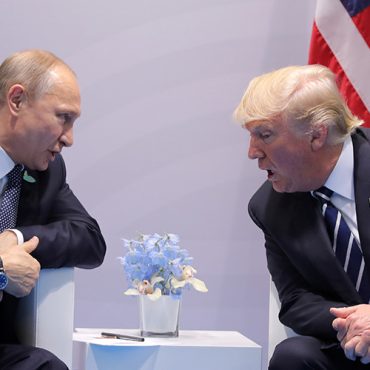This is a rush transcript. Copy may not be in its final form.
AMY GOODMAN: As the official death toll in Gaza nears 34,000, we begin today’s show looking at Germany’s intensifying crackdown on pro-Palestinian voices. On Friday, police in Berlin shut down a three-day Palestinian conference just moments after it began. In addition, Germany’s Interior Ministry banned several speakers from even entering Germany or addressing the Palestine Congress conference remotely. The Palestinian researcher Salman Abu Sitta opened the conference, but his remarks over a live stream were cut short when Berlin police raided the conference site.
SALMAN ABU SITTA: We have never seen before these daily scenes, one massacre after another, homes demolished over the heads of the occupants, bodies pulled from under the rubble, surviving child with all his family killed. We have never seen before people deliberately denied food and water, children starved to death and killed when rushing to get food. We have never seen before all means of life systematically destroyed — hospitals, clinics, schools, universities, libraries, ancient monuments, mosques, churches, universities, cemeteries, bakeries, apartment build—
CONFERENCE ORGANIZER 1: Live stream, we ask you — so, for all people on the live stream, the police is standing right in front of us, and they ask us to stop the video.
CONFERENCE ORGANIZER 2: They are — they’re even trying to take away this microphone!
AMY GOODMAN: That was a live stream capturing the moment when German police raided and shut down the Palestine Congress conference in Berlin just minutes after it began.
On Friday, German authorities also detained and questioned the Palestinian British surgeon Dr. Ghassan Abu-Sittah, who had flown into Germany to speak at the Palestine Congress. Dr. Abu-Sittah, who is the nephew of Salman Abu Sitta, who we just watched interrupted, spoke to Middle East Eye after he was barred entry.
DR. GHASSAN ABU–SITTAH: Upon arrival, I was stopped at the passport office. I was then escorted down to the basement of the airport, where I was questioned for around three-and-a-half hours. At the end of three-and-a-half hours, I was told that I will not be allowed to enter German soil, that I will — and that this ban will last the whole of April. And not just that, that if I were to try to link up my Zoom or FaceTime with the conference, even if I was outside Germany, or I were to send a video of my lecture to the conference in Berlin, then that would constitute a breach of German law and that I would endanger myself to having a fine or even up to a year of prison.
AMY GOODMAN: That was the Palestinian British surgeon Dr. Ghassan Abu-Sittah, who had flown into Germany to speak at the Palestine Congress but was denied entry to Germany. German authorities defended the decision to shut down the Palestinian conference, citing German laws against so-called hate speech. When Dr. Abu-Sittah came out of Gaza, we interviewed him, and you can go to democracynow.org to see that conversation.
We’re joined right now by former Greek Finance Minister Yanis Varoufakis. He was also banned from entering Germany and barred from engaging in any political activity there. Varoufakis is a leader of the pan-European progressive movement DiEM25, which helped organize the Palestine Congress.
Welcome to Democracy Now! Yanis Varoufakis is the former finance minister of Greece. His most recent book is Technofeudalism; What Killed Capitalism is the subtitle. Yanis Varoufakis, can you explain what happened in Berlin?
YANIS VAROUFAKIS: To give you a vignette, Amy, of the absurdity, which would have been funny if it wasn’t so tragic, of what went on, during the morning, just before the police burst in, as you described so accurately, there was a young man who — an attendee of the congress, a member of the Jewish Voice for Peace, which together with the MERA25, DiEM25, we co-organized the Palestine Congress. And this young man, as he approached the police cordon — there were two-and-a-half thousand policemen preventing our attendees from attending the congress. Anyway, he was approaching, and he had a little placard that he had written with his own hand, and it read “Jews against genocide.” And for that, he was apprehended, arrested, manhandled. And while the police were manhandling him, he turned around humorfully, or half-jokingly, and said to them, “Would it have been all right with you if it said ‘Jews in favor of genocide’?” at which point, of course, they were far more angered and manhandled him even more fiercely. I’m conveying this to you, Amy, and to our listeners and viewers because this shows the absurdity of the whole thing.
The police entered the building, the venue, a few minutes before I was due to deliver my talk via video link. As a result, what I did was I recorded my talk, and I posted it online from Greece, from Athens, where I’m even now. And the next day, I found out that a ban, as you put it, was slapped on me by the German authorities, a ban that harks back to laws against Nazism, a law that has only been used recently for ISIS operatives. That was used against me.
Allow me just to briefly say that the rationale behind this is the Germans’ Staatsräson, the logic or rationale of the German state, to protect Jews, which is of excellent rationale. I wish every state had it, each one of us had it, to protect Jews. Except that this is not about protecting Jewish lives and Jews from antisemitism. It’s all about protecting the right of Israel to commit any war crime of its choice, in the final analysis.
JUAN GONZÁLEZ: And, Yanis Varoufakis, the federal interior minister of Germany not only applauded the police action, but she described the event, the conference, as an Islamist conference. What do you think of that characterization of the Palestine Congress?
YANIS VAROUFAKIS: Isn’t it remarkably farcical that our Jewish comrades who helped us co-organize, put together this congress have been dismissed as Islamists? Let me be clear: There were no Islamists in this. And in any case, the reason why our congress has been so, let’s say, unpopular with the German political system is because the German political spectrum — and this is not just the government; this is also the opposition, including some members of the left, I say with deep regret, some of my former comrades — they insist on equating acts of terror, atrocities against civilians — which every soundly thinking person in the world should condemn, and I condemn, of course, and so do all the organizers of this congress — equating, however, violence against civilians with a principled resistance to an apartheid state which is part of a project of systematically ethnically cleansing the population of the Palestinians. That is what they do not want.
They do not want a congress like ours, especially one that includes progressive Jews. That is the main thing that they detested, that they were Jewish demonstrators, Jewish activists, Jewish intellectuals, Jewish speakers with us, with one voice, saying one thing, one thing alone: equal political rights, civil liberties, from the Jordan River to the Mediterranean Sea. I’m neither a Jew nor a Palestinian. I don’t have a view as to how this will be accomplished. But I think every single human person on this planet has an obligation — not a right, an obligation — to demand, from the river to the sea, equal political rights. And the German political establishment does not want to listen to this. They simply want to associate anyone who opposes Netanyahu’s government, or any government in Israel that perpetrates genocide, essentially, to be associated, to be stigmatized as an antisemite, which, by the way, it is the antisemite’s greatest dream come true.
JUAN GONZÁLEZ: Now, Germany has also banned the display of the Palestinian flag. How do you think the suppression of pro-Palestinian protest in Germany — has that spread to other countries in Europe? What’s your sense of what’s going on throughout the rest of the continent?
YANIS VAROUFAKIS: Not formally. The Palestinian flag has not been banned formally. But I can tell you that even here in Greece, anyone who is sporting the colors of Palestine walking on the street risks — seriously risks — being assaulted by ultrarightists, being arrested, apprehended by police for some pretext. The bourgeois, liberal, democratic rights and principles have all been sacrificed on the altar of enabling Israel to complete the genocide which is carrying out — that it’s carrying out not just in Gaza but, as we heard before in the news bulletin, in East Jerusalem and in the West Bank. In the same way that in the 1930s we all had an obligation, a duty, an ethical commitment — or should have had one — to support Jews and to show our solidarity to the Jewish people who were suffering from the Nazi regime, from the Croat Nazi regime, from the Greek fascists and so on, we have a duty today to end the genocide in ancient Palestine.
AMY GOODMAN: Yanis Varoufakis, as a former finance minister, a vocal critic of austerity, how do you perceive Germany’s position on the war on Gaza in light of its significant arms sales to Israel? I mean, you have Nicaragua taking Germany to the International Court of Justice, saying that by providing weapons for Israel to carry out this war, that it’s engaging in crimes against humanity or war crimes.
YANIS VAROUFAKIS: Well, Amy, it’s interesting and, I think, not coincidental that on the Monday before the invasion, the incursion by the German police into our Palestinian Congress in the venue in Berlin, I happened to be in Milano, in Italy, in Milan. And I was giving a speech to a gathering of hundreds of financial analysts, the top, the crème de la crème of European financial experts. And in it, unbeknownst to me of what was going to happen later on that week, I outlined dire prognostications about the long-term damage inflicted upon Germany and Germany’s social economy by decades of austerity, combined with impressive largesse finances, what you call in the United States quantitative easing. And, you know, I was really surprised, because here I am, a lefty, addressing a gathering of hundreds of financial experts. Those hard-nosed financiers actually applauded me. And afterwards, they came to me, and they said that they agree with what I was saying. And I have to tell you that when that happens, I get really worried, because if these hard-nosed financiers, many of them German, came to me and they said that they agreed with my prognosis that the German business model is kaput, is in dire straits, I start feeling very uncomfortable.
So, I think there is a connection, because here you have a political system in Germany which understands in its bones that the economic dominance that the German industrial model had within the European Union for so many decades is now waning. And when such a regime feels threatened, feels that its economic prowess and authority and dominance is waning, it’s really very easy for that to translate itself into movements that essentially fan the flames of increasing, and increasingly farcical, authoritarianism.











Post comments (0)